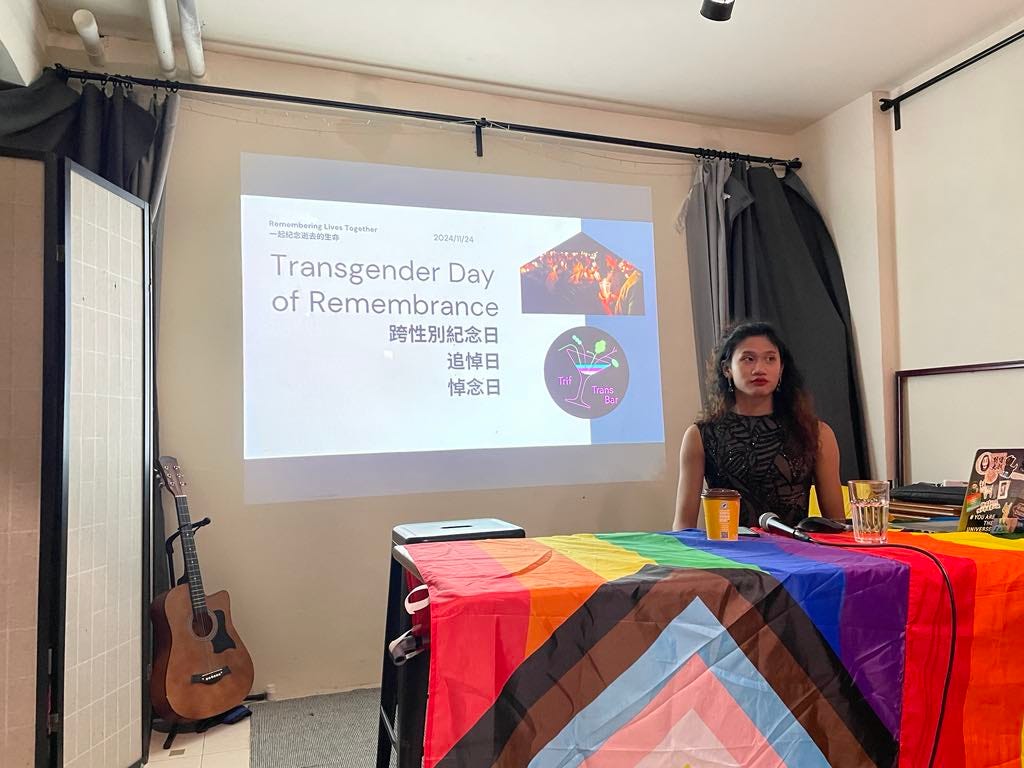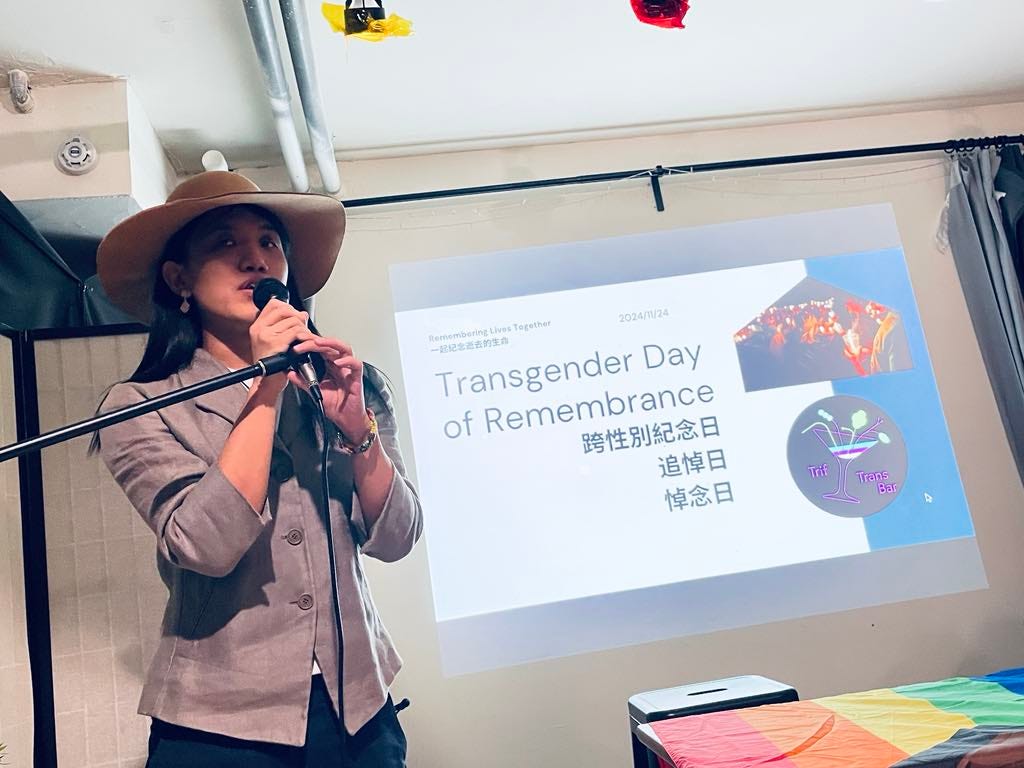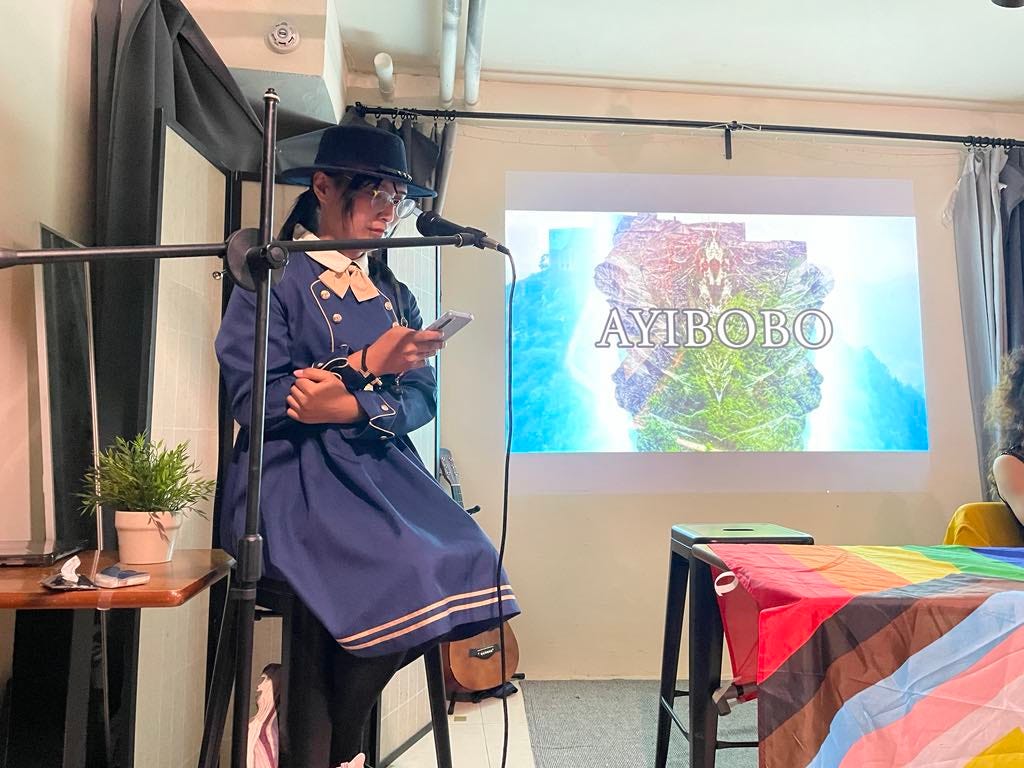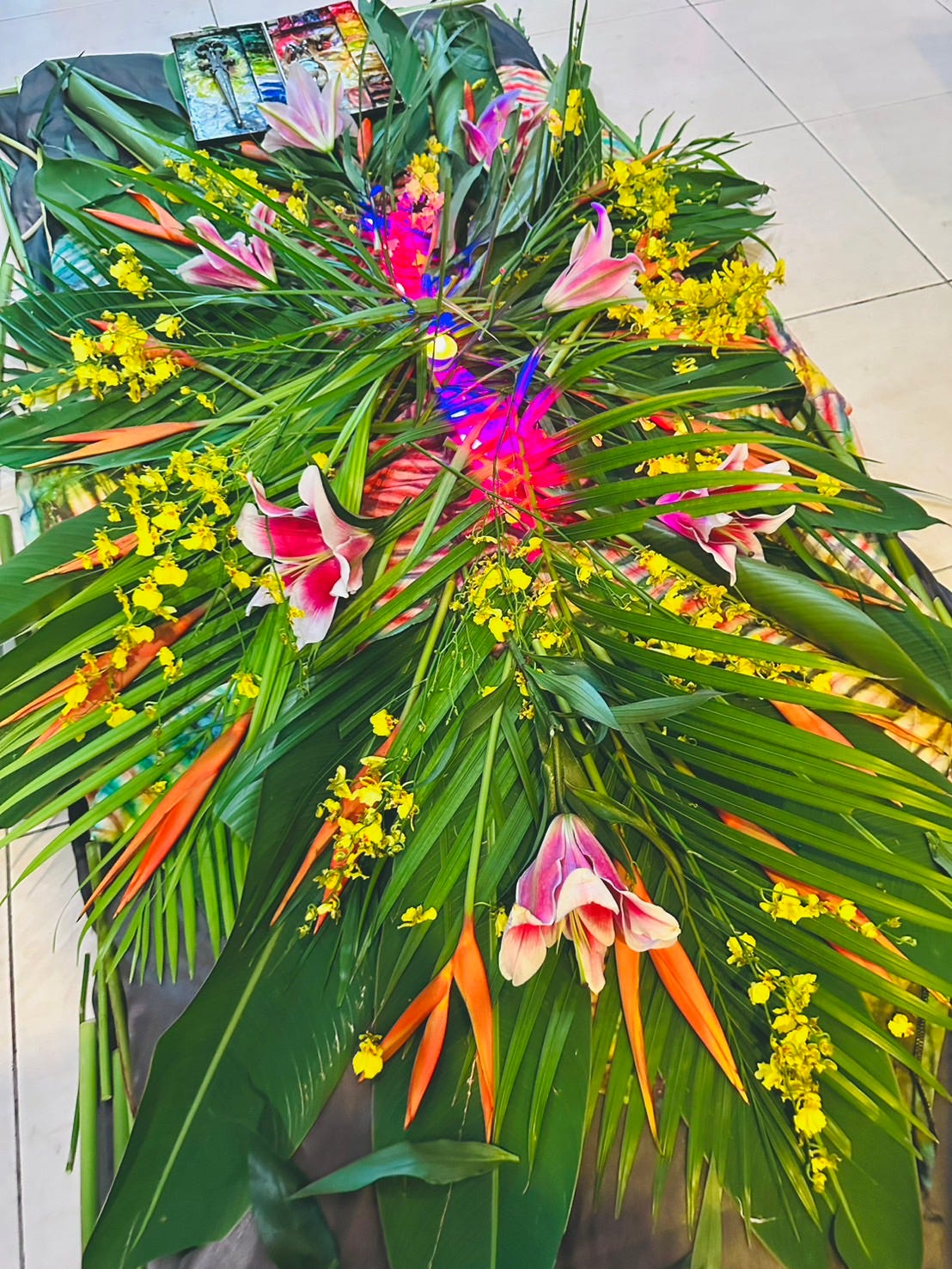TDOR Event w/ ISTScare and Trif Trans Bar
[Summary by: Community members Micah (he/him), Hammie (i/i/i--e), and Oyana (she/her)]
Sunday November 24th’s Transgender Day of Remembrance (TDOR) event had a profound ceremonial mood and was lovingly thought out. The central narrative of the event was to celebrate the trans community, and alongside our mourning, to also hope, work, and live toward a future of trans joy. In order to support the wellbeing of the trans community, ISTSCare is calling on community members to invest in the long-term sustainability of our transgender community. Please see the details here to contribute.
The New Bloom space was decorated with low lights, scored throughout the event with calming live piano provided by musicians from Tong-Kwang Light House Presbyterian Church. The chairs were set around an oblong rectangle floor level altar, covered in fabric, a mandala of fresh flowers and greenery, a candle, and some of Red Tail’s memorabilia such as her painter’s palette. The altar was created by community member Micah and Haitian-American trans organizer Oyana.
There were about forty people in attendance over the course of the night, with a variety of ages ranging from 20s to 60s and a diverse range of nationality backgrounds. The event was conducted mostly in Mandarin, with a good part of it followed by English translation thanks greatly in part to trans organizer Hammie’s hard work.
Hammie opened the event, inviting trans folks attending to sit in the more central space by the altar. Trans organizer and activist Abby Wu then came up to discuss the currently urgent matter of cyberbullying happening to the trans community here in Taiwan, and asked that members of the community be active in fighting this insidious form of violence that has become so prevalent. Li Kotomi’s recent case is one such example.
Abby also shared the story of 小波, a trans woman friend who she describes in one particularly bright and loving memory as elegant, in a yellow dress, and curly hair. 小波 hoped for one day being able to transition without mandatory surgery, and Abby and other friends supported them along their journey. 小波 faced many difficulties from her family and discrimination in society, as well as personal health issues. Tragically, 小波 passed away before she turned forty. A key reason was kidney failure due to trans discrimination preventing her from having bathroom access.
Shortly following 小波’s death when Lisbeth Wu was finally able to change her legal gender, Abby both laughed and cried at how bittersweet the victory was, as 小波 wasn’t able to achieve her dream but it was so close. Abby shared in a heartfelt way that so many trans people face vitriol, stigma, and discrimination in Taiwanese society, and she hopes that by using her voice and by sharing stories such as 小波’s, she can contribute to the liberation of the community.
Trif then addressed the crowd, introduced the Trif Trans Bar they founded three years ago as a safe space for trans people, as well as sharing some of the bar’s history. People in the community are welcome to come and spend time there every Friday, 7-11pm. Trif also introduced the group they founded, Trans Nonbinary Queer Sluts, as well as the T&N yearly party as other resources for trans folks looking to build more community.
Inviting us to reflect and remember the lives of trans people who have passed, Trif then shared a video called Short Life Stories (content warning) by the group White Ribbon. The short film follows the life of a trans woman named Vivian in a beautiful queer community she built, as well as the struggles she and her trans community face at home and in society. Her story, like many others in the community, tragically ends too soon.
Trif then shared 2024 statistics from Transgender Europe on violence against the trans community.
Trif then went on to question why the murder rate is not as intense in Taiwan, questioning: “Is it because Taiwan is more safe?” On the contrary, they pointed out how the violence facing trans people in Taiwan is more insidious: surfacing as online bullying, doxxing, emotional and verbal abuse, etc. The intense psychological violence then leads to mental health issues. To put it bluntly, “they won’t kill you, they’ll make your life a living hell.”
Trif then expounded on the attacks on and subsequent coming out as trans by Li Kotomi. They shared QR codes to Li Kotomi’s TDOR statement in Japanese, Mandarin, and English.
Next we met Yuri, who organizes a trans and crossdressing community space, TG Family (known as 偽娘基地 in Mandarin), in Taiwan. This space helps trans folks find community and connect to clothing and make-over resources as they transition. She has been facilitating the space for almost ten years now.
She shared her personal story of how it was very hard in the beginning of her own coming out experience,but she was grateful and lucky to find supportive friends who helped her have a space to foster community.
Yuri’s own story was sensationalized in the news, leading to bullying and online harassment. The publisher was responsible for the sensationalization of her story. Although the article was corrected back to its original form as Yuri and the reporter, 汪汪, intended, the reporter later died falling from a high building after the violent online fallout of the situation.
She also shared a community member, Monica’s story, as well. Monica was a commercial pilot who enjoyed spending time at TG Family to connect to her authentic self. Due to serious illness, she passed away, and Yuri and her community helped take care of her sensitive belongings in the wake of her passing. Yuri’s story powerfully highlighted how our own community can care for each other in the most difficult and vulnerable situations. The community at the event space, after hearing Monica’s story, memorialized her and honored her memory by saying her name and 「願妳安息」or alternatively “Rest in Power.”
After a short intermission, trans organizer Oyana came up to educate the community in depth on Haitian Indigenous history and how it’s rooted in trans liberation. Oyana has worked with Trans Bla(c)k and Indigenous groups in Haiti, the United States, and Australia.
Oyana began by explaining the history of the Indigenous peoples of Haiti (the Taino), and how the continued colonial violence of the French and Spanish empires led to people being stolen from Africa and trafficked to Haiti through the Trans-Atlantic Slave Trade.
During France’s occupation of Haiti, all Indigenous culture (language, dance, music, spirituality) was banned and punishable by death. France became a wealthy global power from 1659 to 1804 through the enslavement of African and Taino people.
Oyana then explained how Maroon communities formed from Indigenous Taino people and Africans who escaped enslavement on plantations to the mountains, creating their own rich culture and communities. This led to one of the first cases of Indigenous futurism as the result of Western colonialism: the fusing of 21 African and Taino cultures and ethnicities. This fusing led to the creation of Haitian Vodou. Vodou translates directly to “understanding how the universe works.”
From 1791 to 1804, the Haitian revolution was sparked by a Haitian Vodou ritual. Erzulie Dantor, a Petwo spirit often depicted as a trans woman, led the revolution. She instructed enslaved Haitians to burn the plantations, and over 100,000 Haitians revolted the following week.
Oyana then shared a powerful image of Jan-Jak Desalin cutting the white of the French flag after the French were defeated in 1804. Desalin united the red and blue to symbolize the Black and Taino people driving out the French to form the first Black Republic. Haiti was also the first country to abolish slavery and the first successful slave rebellion to overthrow its colonial enslavers.
Oyana emphasized to the audience that a transgender spirit led this revolution. She also introduced the Lwa Dantor, the protector of lesbians, mothers, intersex people, and trans women. In the present day, Vodou houses are a safe harbor for young people in Haiti, some of them being specifically trans-centered safe spaces.
Oyana then shared how Vodou priests are initiated into Lwa, or the entities of cosmic law, and abide with them. After being initiated, the shaman’s genders include the genders of the spirit(s) they are initiated to. She also explained that the Arawak and Taino culture has five genders. West African cultures also have complex gender concepts, gendered societal roles, and specific shamanic roles for trans people because they have a perspective beyond the gender binary.
However, colonial Christian powers in Haiti targeted trans people, who often served as leaders in the Indigenous community. Colonial powers also removed and destroyed symbols of cultural and spiritual sovereignty. Oyana emphasized that the transphobia that still impacts the people of Haiti and across the globe is the direct product of racism, colonial violence, and genocide. By being aware of this oft-untold history, the community can better fight it.
Trans organizer Pacake from the Indigenous Drekay nation (also known as Rukai in romanized Mandarin) then shared about how Indigenous people in Taiwan experience transphobia and queerphobia as a direct result of colonialism. This impact is not limited only to Indigenous communities, but also across Taiwanese society at large, as Taiwan has been governed under multiple colonial regimes.
What Oyana and Pacake shared not only gave the audience insight into Indigenous culture, but also allowed non-Indigenous audience members to gain an important perspective on how broader Taiwanese society enforces gender roles, which leads to transphobia and queerphobia.
In the later part of the event, Hammie projected a collage of the many trans folks who have passed in the last year, originally created by TDOR.translivesmatter.info.
Hammie then invited trans folks to come sit in an inner circle around the floor-level altar, amidst a symbolic protective shield of cis allies sitting in an outer circle. Hammie then led the community in reflecting on the lives of all trans people who have passed away over the course of the last year.
We then reflected on the many who have died due to wars and genocides caused by colonial violence in Haiti, Sudan, The Democratic Republic of the Congo, and Palestine. Hammie also highlighted that the lives of trans people are more severely impacted by these violences, despite the world’s lack of awareness of their stories. In their honor we recited「願他們安息」,or alternatively, “Rest in Power.”
Hammie then led the audience in memorializing individuals linked to the trans community present, first by repeating their names and then by twice repeating 「願妳/你安息」or alternatively, “Rest in Power.” Memorialized community member previously passed included Monica, 汪汪, Red Tail, Skylar, Blake, and 糖果姐姐. Those who passed this year included 吳芳萓 and 小波. Other community members later also took the floor to memorialize people close to them.
Micah also shared that the flower altar would be broken up into small bouquets for community members to take home after the event, to both remember those who have passed and for the community to have their flowers to enjoy and treasure in the wake of the moving event.
There was another brief intermission near the tail end of the event, and then a profoundly moving private community discussion time for attendees. Overall, the event was a visceral time of honoring, learning, crying, singing, reflecting, and feeling strongly in community. Many thanks to the organizers for their hard work and to the community members who attended.
If you would like to make a meaningful contribution to the wellbeing of the trans community, ISTSCare is calling on community members to invest in the long-term sustainability of our transgender community. These funds will directly support trans people in crisis, including housing, medical, and legal needs. You can follow this link to contribute.






